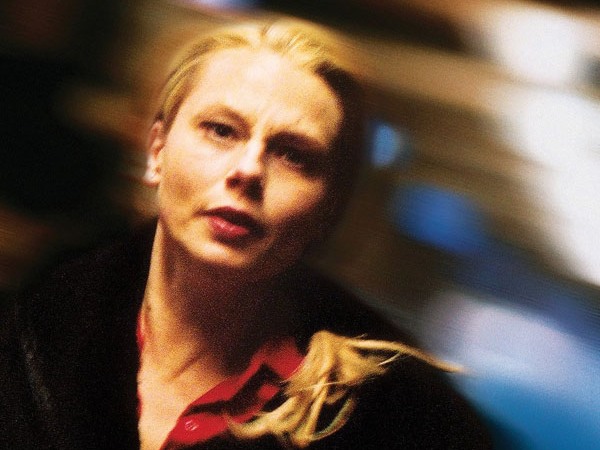Unless you watched these episodes when they premiered in the US a while back, you might be thinking, “This doesn’t look like the Annika Bengtzon I remember.” And you’d be correct.

This Annika Bengtzon is played by Helena Bergström (Medicinen), not Malin Crépin, whom Euro TV fans recognize as the eponymous Swedish tabloid journalist created by author Liza Marklund in her series of “Annika Bengtzon” crime novels.
Similar to Rolf Lassgård playing Kurt Wallander before Krister Henriksson (and Kenneth Branagh), Bergström was the first Annika Bengtzon. And the two episodes on this DVD release for Episodes 7 and 8 are more like Episodes 2 and 1, respectively, as they were produced a decade before the ones featuring Crépin. And the story in “Paradise” is also set further back in Bengtzon’s timeline.
Speaking of…
“Paradise” (“Paradiset“)
A family is massacred during a wedding celebration, but there is one survivor: a young Bosnian woman. Several years later, she is running from the murderer while another man lays dead by the harbor in Stockholm, the victim of a Mafia-style execution.
 At the evening tabloid newspaper Kvällspressen, Annika Bengtzon’s job is to edit copy and answer the phone. But the wanna-be journalist is running with a tip she received about Paradise, a foundation that helps abused women and is subsidized by municipal funds managed by Thomas Samuelsson (Niklas Hjulström, Millennium).
At the evening tabloid newspaper Kvällspressen, Annika Bengtzon’s job is to edit copy and answer the phone. But the wanna-be journalist is running with a tip she received about Paradise, a foundation that helps abused women and is subsidized by municipal funds managed by Thomas Samuelsson (Niklas Hjulström, Millennium).
Despite ruffling the feathers of her coworkers and boss, Annika keeps working on the story, and meets the foundation’s director, the Bosnian woman, a source with first-hand knowledge about what the organization is and isn’t, and Thomas. And as she and Thomas delve deeper to find evidence of fraud, the two get closer, and she reveals to her married paramour the incident from her past that’s responsible for her nightmares.
Deadline (Sprängaren)
Now married to Thomas and the mum of two young children, Annika is in the middle of the same nightmare when she is woken by a call: Stockholm’s Victoria Stadium has been blown up, and speculation runs rampant that it was an act of terrorism.
The one fatality is the woman who was the Director General of Sweden’s committee for the Olympic Games, an event that many in the country don’t want. As Annika investigates the bombing, she learns something that leads her to believe the motive was personal. Finding evidence, though, proves to be difficult. Life threatening, even.
Feeling threatened, marginalized, and just plain pissed off are Annika’s colleagues. Things have gotten ugly since she was made the News Desk Editor, a situation not helped one whit by Annika herself, who’s turned into quite the antagonistic, profanity-spewing b… tyrant. Regardless, the news business continues, and there are more angles to cover when another building is bombed and another person dies, followed by a third explosion that results in multiple injuries. This time, though, there is a solid clue, and it’s linked to Annika.
Costarring with Helena Bergström are Örjan Ramberg (Wallander) as Annika’s boss Anders Schyman, Reine Brynolfsson (Medicine Man) as veteran reporter Spiken, Maria Lundqvist (Everlasting Moments) as Annika’s nemesis Eva-Britt, and Brasse Brännström (Mother of Mine) as the old-timer Nils Langeby.
As with the stories featuring Malin Crépin, these two feature-length episodes of Annika Bengtzon are dark, their main plotlines intriguing. And the acting is quite good. However, certain elements just don’t work.
For one strand in “Paradise,” there is no definitive answer to why a particular event happened, and a bit of dialogue toward the end leads one to infer that Annika had been a reporter at Kvällspressen before her copy editing stint, which she wasn’t. In “Deadline” one character’s drastic change in personality (from the first episode) is jarring, and what seems like a new position for him in the newsroom isn’t necessarily that, so it’s a bit confusing. Then there are the instances of implausibility.
Also, certain personality traits of the Annika Bengtzon character are brought to the fore in the second episode, ones that make her less of a sympathetic and likable character. I get the stress of being under pressure, but still. It’s depictions like this, of the main and a few secondary female characters, that perpetuate the notion that women must be bitches to survive and thrive in the workplace. (Then again, that notion could very well be accurate…)
That said, in spite of being annoyed on occasion and feeling meh in terms of entertainment satisfaction at the end, both episodes still held my attention throughout. Final rating: ★★★
__________________
Add your comments on our Facebook and Twitter pages.
Share this post/page.
